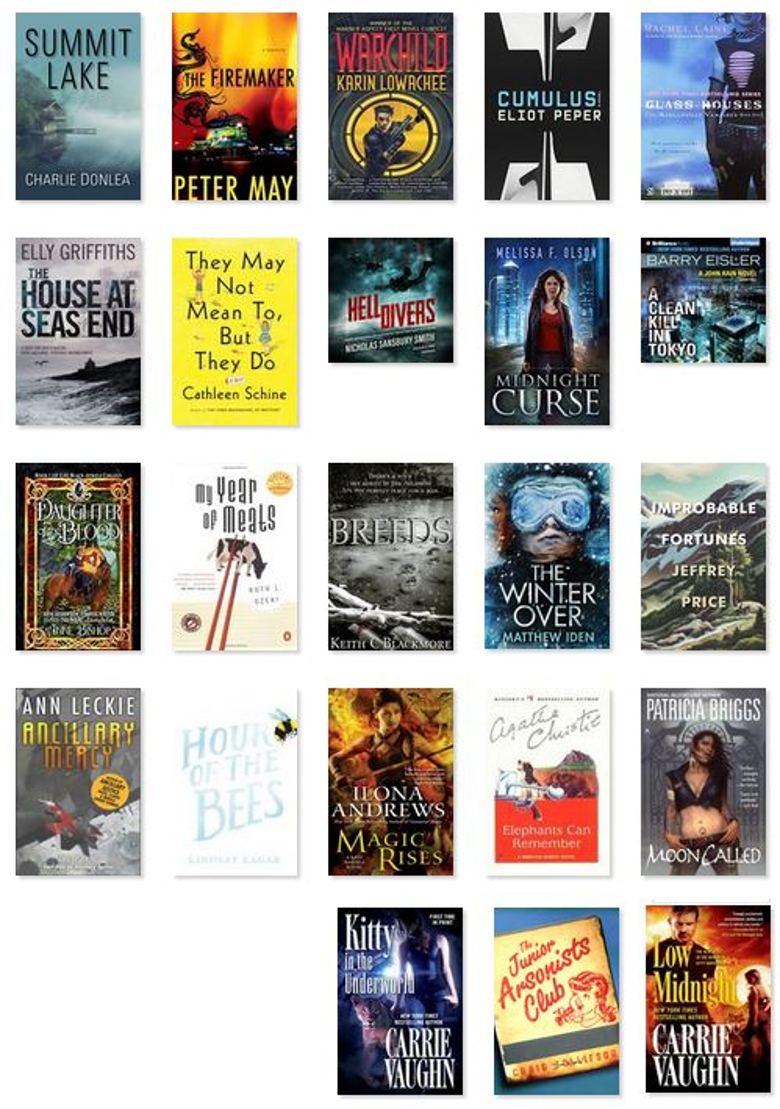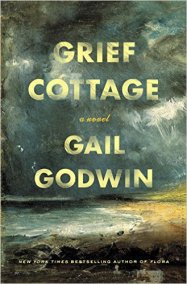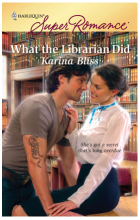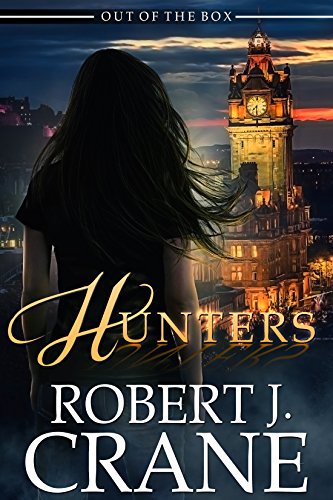
In the first three months of 2017, my job so much of my time and my energy that I began to resent not getting enough time to read, think and write about my books. I tell myself that this doesn’t mean I’m addicted, just that books are necessary to my peace of mind.
I read twenty three books in the quarter. All but four of them were genre reads (urban fantasy, science fiction, thrilers). These are my comfort foods and their predominance in my diet shows the stress of the quarter. Nevertheless, some of them turned out to be challenging and stimulating in unexpected ways.
So here are the best and most disappointing of the twenty three.
Best Read of the Quarter “Warchild” by Karin Lowacheeis one of the most original, vivid and emotionally engaging science fiction books I’ve read in a long time.
“Warchild” by Karin Lowacheeis one of the most original, vivid and emotionally engaging science fiction books I’ve read in a long time.
In “Warchild” Karen Lowachee has been brave enough to focus on the emotional damage war inflicts on the most vulnerable. The book confronts the reality of the damage done to the life of Jos, a nine year old boy who is abducted, enslaved and abused by the pirate who attacks his ship and kills his family.
The first section of the book is particularly hard on the emotions. Jos’ description of his abduction and what happened during his enslavement is written in the second person, giving it a distant, disconnected feel, like someone reporting something that happened to someone else a long time ago. The distance amplifies the sense of helplessness, of wrongness and brutality in a way that breaks the heart and stokes impotent rage.
“Warchild” has an original plot and world-building that would make it first class science fiction but Karin Lowachee pushes herself to go further. She keeps the focus on Jos as he finds himself having to choose between two strong men, an Alien Commander and a Human Commander, each of whom seem to want something from him. Both men help him develop as a soldier. Each offers patronage and expects loyalty. Jos cannot bring himself completely to trust either man.
Karin Lowachee’s writing is assured and skillful, managing to combine depth with brevity. “Warchild” left me emotionally frayed but still hungry for more. Karin Lowachee is now on my “IF she wrote it, I’ll read it” list.
Best New Finds of the Quarter “Hour Of The Bees” by Lindsay Eagar was my most pleasant surprise of the quarter.
“Hour Of The Bees” by Lindsay Eagar was my most pleasant surprise of the quarter.
It was a book I went to with wariness. The blurb sounds a little miserable, a twelve year old girl forced to spend the summer with a grand father she barely knows and who is sinking into the quicksands of dementia. The cover is bland, amateur, and not even slightly intriguing. I read it because Almarie Guerra is the narrator and I loved what did with “The Water Knife”.
Fortunately, “Hours Of The Bees” turned out to be a fresh, original and pleasantly non-didactic book that made me think, cry and occasionally laugh.
It centres around an eleven year old girl who is beginning to discover her identity and her independence and the relationship she builds with her newly-met grandfather who is losing both his identify and his independence.
While the two of them spend the summer together on an isolated ranch in the Painted Desert, her grandfather tells her the story of his life, starting always with “Once upon a time”.
Much of my pleasure in the book came from the splendid ambiguity created by having what might otherwise be a one of those tiresomely pious magical realism be told by an old man with dementia to a girl with limited experience of life. This ambiguity left me to make up my own mind and helped me to concentrate on the emotional truths of the novel: that life must be embraced to be lived, that love is the anchor of hope and that a place can have a soul that we can push roots into and be nurtured by.
The pace of the story-telling is perfect: slow enough to give the sense of time passing on a remote desert ranch and fast enough to keep you wondering what will happen next. Each moment is threaded between the pearls of “Once upon a time…” story telling that changes the context of the present moment and the meaning of everything that passed before.
 “Improbable Fortunes” by Jeffrey Price, is as improbable as the title suggests but is all the more fun because of it.
“Improbable Fortunes” by Jeffrey Price, is as improbable as the title suggests but is all the more fun because of it.
Set in Vanadium, a town built around a worked-out uranium mine in South West Colorado, “Improbable Fortunes” tells the story of a likeable, impeccably honest, and almost unbelievably naïve, ranch hand called Buster,
The story opens with a dramatic and slightly zany disaster, involving a mud slide a destroyed luxury ranch house that is, for some reason, full of cattle, a damsel in distress and Buster, apparently to blame for it all.
Most of the rest of the book is spent recounting Buster’s progress towards this event from his birth onwards.
Abandoned at birth, Buster is raised by a variety of foster parents who gift him, almost accidentally, with a wide range of skills that will become useful to him in later life
The families that Buster lives with each has something odd about them and each suffers an unexpected tragedy that soon gives Buster a reputation as Jonah or worse.
Buster is guided through his chaotic life by the local sheriff who acts as Buster’s guardian angel for reasons that only become clear towards the end of the novel.
“Improbable Fortunes” is the kind of book that you can only really get by reading it, not be reading about it. Even then, if you’re like me, you’ll be smiling, scratching your head and saying “I’ve no idea what just happened but I enjoyed it so much I want ti to happen again”.
Best New Series of the QuarterThis quarter I’m going to pick two “Best New Series”, one from the Urban Fantasy genre and one from the thriller genre. Both of them are now in my “I’ll let myself read one a month so that I won’t get through them too quickly” category.
 I’m over a decade late joining the Mercy Thompson party (partly because I was put off by the, mostly inaccurate, covers) but now that I’ve read the first one, I want the rest RIGHT NOW:
I’m over a decade late joining the Mercy Thompson party (partly because I was put off by the, mostly inaccurate, covers) but now that I’ve read the first one, I want the rest RIGHT NOW:
I finally picked up “Moon Called” when I found that I was going to be trapped on another long-haul flight where they lock me in a steal tube for nine hours at a time. It was a good choice, time flew by and Patricia Briggs now has a new fan.
“Moon Called” is Urban Fantasy as it should be. There’s a likeable, kickass heroine who was raised by werewolves, makes her living fixing German cars, can take on the shape of a Coyote at will and is happy to spend time with fey, vampires, werewolves and humans as long as they’re interested in cars. There’s a complex cast of weres and vampires and fey and humans who are written up as people rather than game avatars. There’s a nicely curly plot with strong action scenes but with a pace slow enough to give me time to get to know people.
The whole thing has a positive, feel-good vibe to it without getting cosy and losing its edge.
Perhaps the main thing is that I like Mercy Thompson and want to know what happens to her

Barry Eisler recently reacquired the rights to his John Rain novels, gave them new titles and new covers and personally narrated new audiobook versions.
I was intrigued and decided to try the first book “A Clean Kill In Tokyo” which was published in 2002 as “Rain Fall”.
It was a fun read all the way through, not least because Barry Eisler turns our to be an excellent narrator.
John Rain is a Tokyo-based assassin, who specialises in making it seem as if the men he kills die of natural causes. Rain had a Japanese father and a white American mother, was raised in both countries and is fully at home in neither. He lives an affluent but disconnected life, built on killing for money.
In this novel, he’s the hero. That’s not a role he has much experience of. He takes it on reluctantly and it doesn’t entirely fit him. Even as a hero, his kill-rate is very high and causes him not a moments disquiet.
The foot-in-two-worlds aspects of the book are well executed and gave me an intersting blend of the familiar and the exotic..Tokyo becomes almost a character in the book. It’s described the way someone who lives there would see it, with its peculiarities taken for granted. The tourist map of Tokyo has been overwritten by one that stresses the places that are important to John Rain: Jazz Clubs. Whiskey Bars and the intricate subway network that he uses to elude those trying to follow him.
The plot is a mixture of backstory, explaining how John came to be the killer he now is, and a protect-the-brave-independent-but-vulnerable-damsel-in-distress theme that’s given a twist by the fact the Rain killed her father.
There is political intrigue, espionage, crime, corruption and lots and lots of fight scenes featuring martial arts, street fighting, knives, staves and guns.
I’m hooked now. Fortunately, there are eight John Rain books in print with a ninth coming out in July. .
Biggest Disappointment of the Quarter
I bought “Daughter Of The Blood” because I’d read and enjoyed a “Black Jewels” short story and because I’m a fan of her “The Others+ series
In audiobook format, “Daughter Of The Blood” runs for a little over sixteen hours. I made it to a little over two hours before setting it aside.
The ideas are original, complex and fascinating. I can see that it has the makings of a strong trilogy but it’s not one I’ll be reading.
The story was much darker than I expected. There is a sharp edge of sadism that cuts into the flesh of the story lightly but persistently, leaving thin rills of frustrated eroticism draining into my imagination. If this had been more skillfully done I might have run with it but much of the story in the first couple of hours was tell rather than show and I grew weary of being fed on backstory and foreboding rather than character and action.
The narrator of the story seemed unable to leaven the text but rather fell into a declamatory style that assaulted the ears and added nothing to the atmosphere or characterisation.
The main thing I took away from this book was how much stronger Anne Bishop’s storytelling is now than when this novel was published.
Advertisements Rate this:Share this:
- Share





